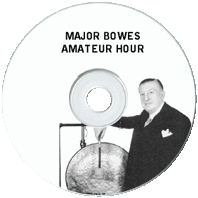

Thousands from All Over the Country Flocked to Join this Gong-style Talent Show.

8 old time radio show recordings
(total playtime 5 hours, 55 min)
available in the following formats:
1 MP3 CD
or
6 Audio CDs
Text on OTRCAT.com ©2001-2025 OTRCAT INC All Rights Reserved. Reproduction is prohibited.
Major Bowes
(1874 – 1946)

The amateur talent contest craze was at its height in the 1930s, and Major Bowes stepped in to take advantage of it. At the height of the depression, this popular show made the major a rich man, making two million a year – twice that of Al Jolson, and Jack Benny.
Poor folks traveled from all over the country to be on the New York show. Selling their houses, hitching rides, traveling in box cars, over 10,000 people applied weekly to be on the program. Many of the applicants were poor black men from the south, hoping to tap dance, sing or harmonica their way to fame and fortune. Most were turned away, as only 500-700 were auditioned and only 20 appeared on the show. Even after making the cut-throat audition and appearing live on the show, many were gonged off before finishing their act, a cruel practice that made audiences roar with laugher. Although competition was fierce and spots on the show were difficult, many who even did well on the show did not continue on to be famous. A few of the exceptions were Frank Sinatra, Beverly Sills, Paul Winchell and Robert Merrill.


For more talent scount excitement, see also: Rudy Vallee, Talent Show Collection, and Arthur Godfrey.

Text on OTRCAT.com ©2001-2025 OTRCAT INC All Rights Reserved. Reproduction is prohibited.
You have reached the maximum number of votes for a unregistered user.
Please login or create a new account to continue...
You have reached the maximum number to down votes in this page.



Major Bowes Disc A001
|
Add Audio CD to Cart - $5.00 |
Major Bowes Disc A002
|
Add Audio CD to Cart - $5.00 |
Major Bowes Disc A003
|
Add Audio CD to Cart - $5.00 |
Major Bowes Disc A004
|
Add Audio CD to Cart - $5.00 |
Major Bowes Disc A005
|
Add Audio CD to Cart - $5.00 |
Major Bowes Disc A006
|
Add Audio CD to Cart - $5.00 |
Please wait...
COMMENTS
Dan Verified Purchase
Brad Verified Purchase
James Verified Purchase
James Verified Purchase
Leave a comment